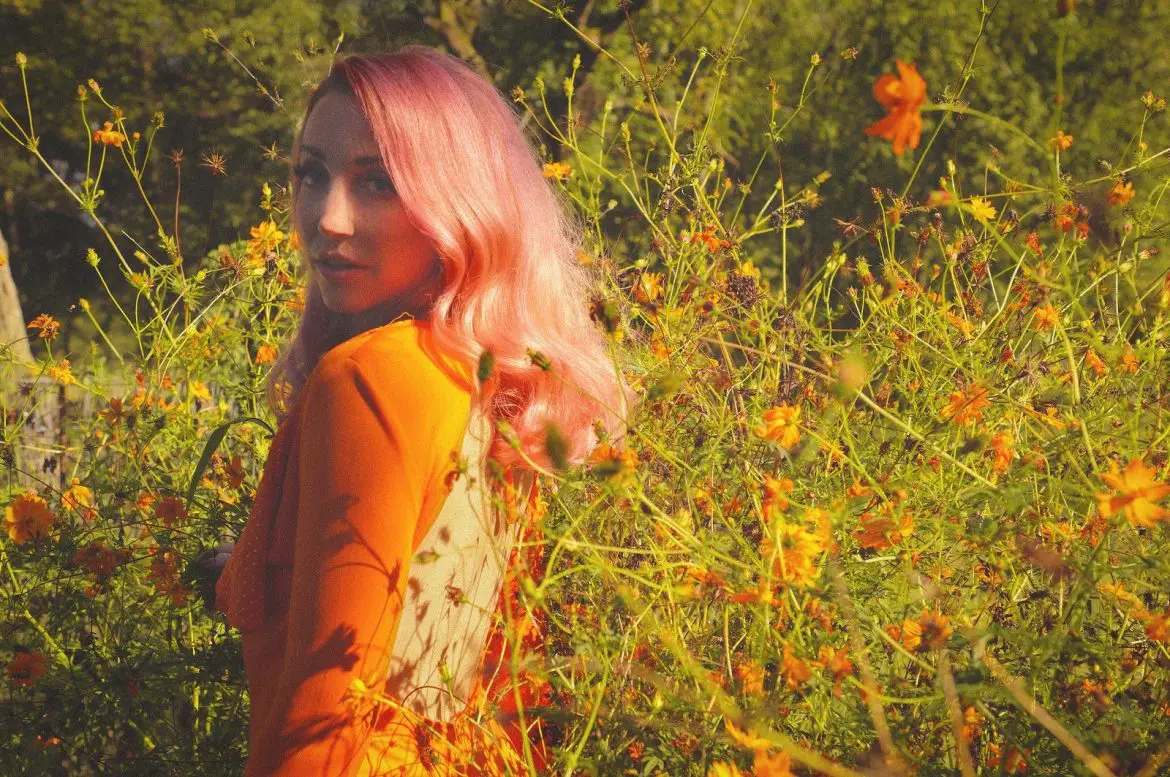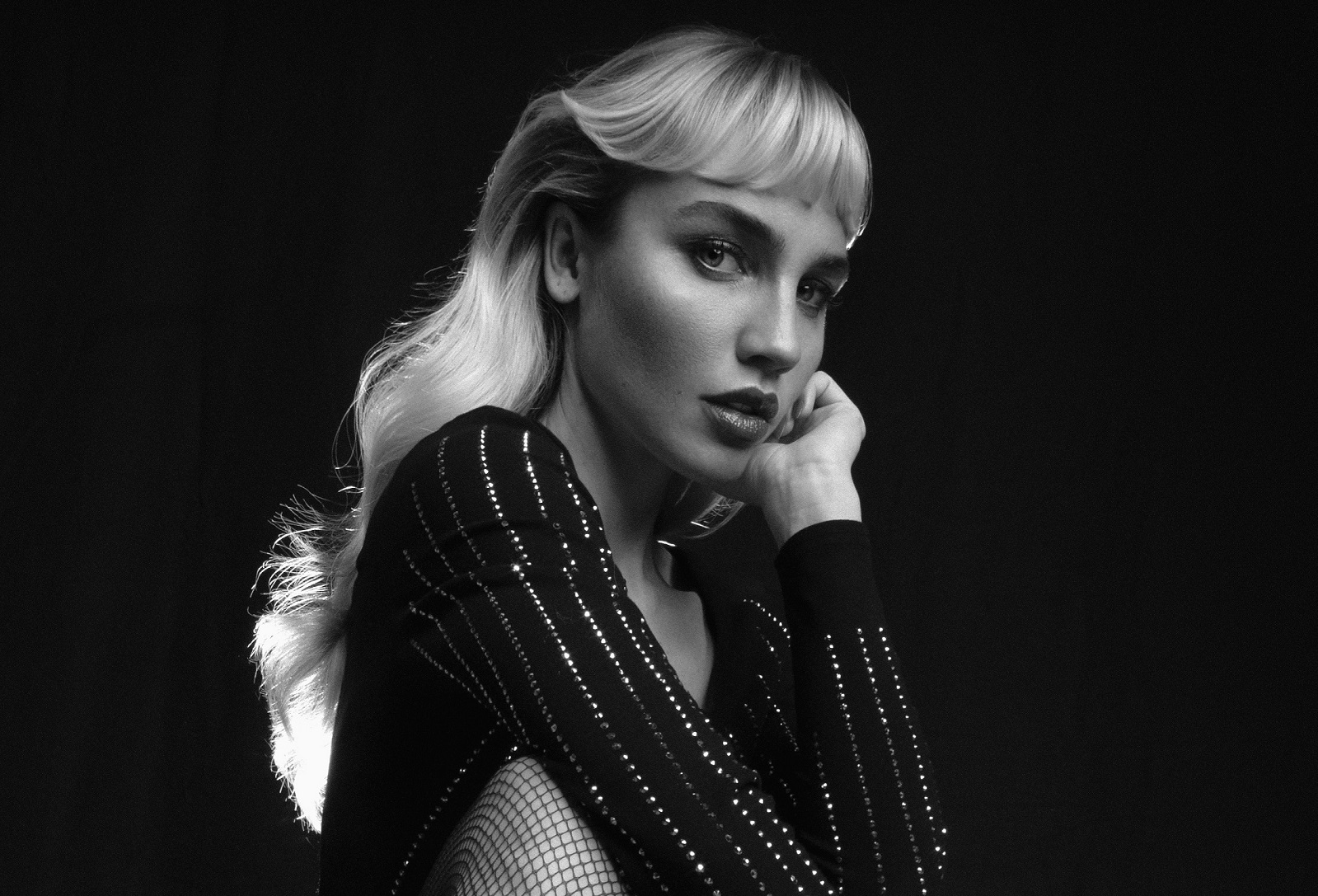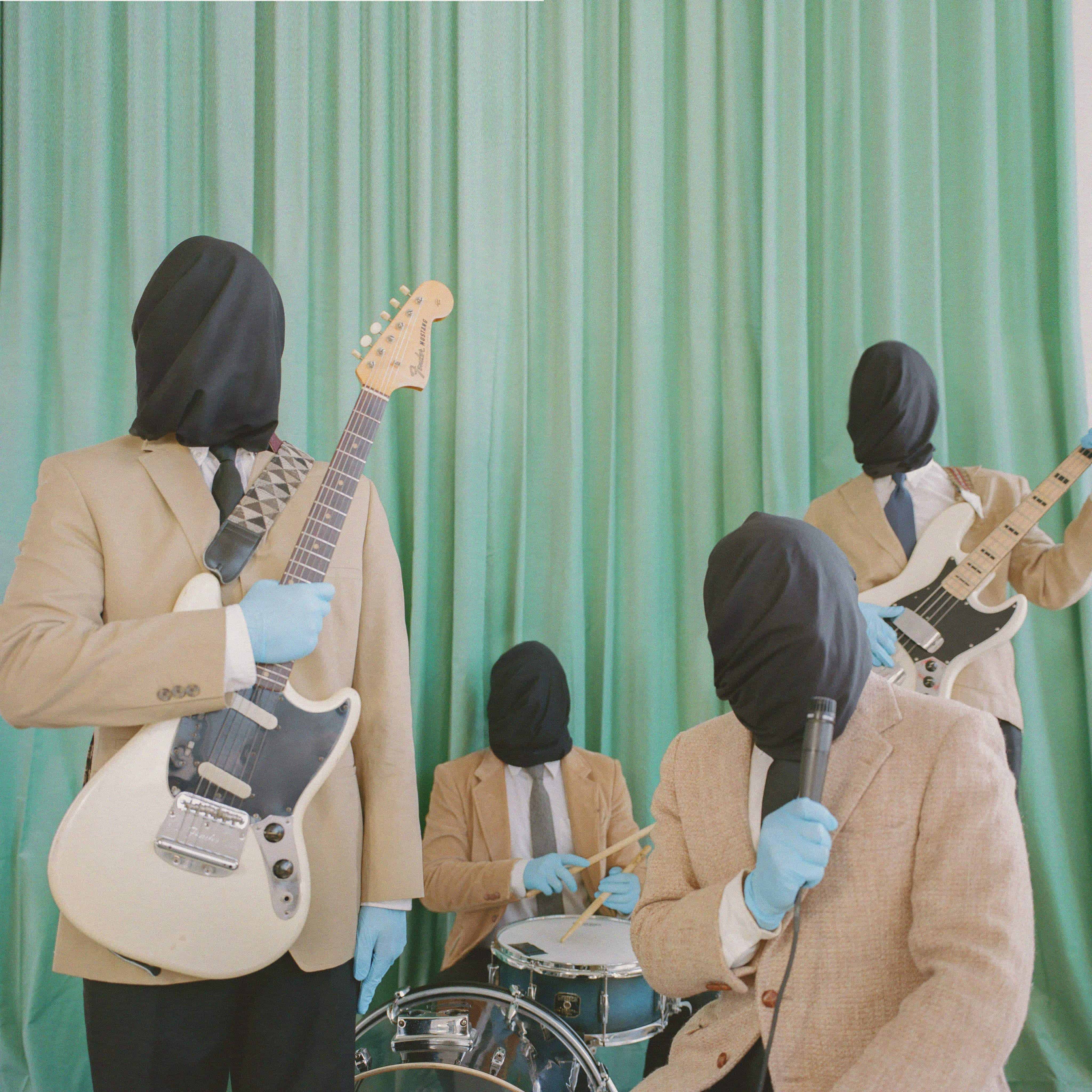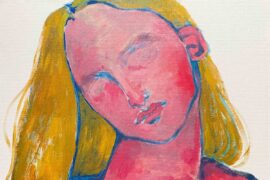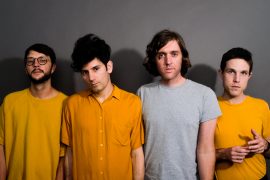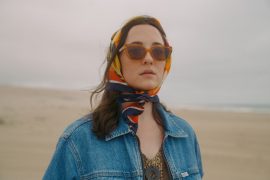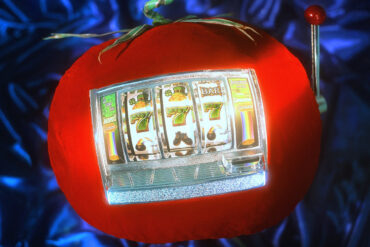Ashley Monroe is best known for her Appalachian soul and signature melancholy songwriting, but on her brand new album ‘Rosegold,’ Monroe foregoes the sadness and chooses playful exploration and joy.
Stream: ‘Rosegold’ – Ashley Monroe
“Yeah, it might get bad before it’s better, sometimes it doesn’t come together, ‘Til it breaks”, sings Ashley Monroe on her new album Rosegold. Recorded before the pandemic, this refrain now takes on a different meaning 12 months later.
Atwood Magazine spoke to Ashley Monroe from her home in Nashville. The blossom was in full bloom just outside her window and everything was beginning to change from muted tones to bright colors, full of hope for the coming seasons.
A CONVERSATION WITH ASHLEY MONROE

Atwood Magazine: Rosegold is very experimental in its sound, and it feels at times like a departure from your first four albums, but also a continuation of them too. Can you talk about the album and where the sound came from?
Ashley Monroe: I started hearing the melodies early in the morning in my closet, after I got let go from Warner Brothers and after I’d had my son. When I got let go from Warner Brothers, I thought, ‘You’re a songwriter and you love music, just go create music’. Just go be free, see what happens.
In my life I was feeling this joy, from my husband and my son, and this love, this deep-rooted love, this deep-rooted innocence from my son. Also, feeling more confident as a woman, having had a child and letting all the stuff that doesn’t matter, just go ‘swoosh’, away, you just don’t care.
So, all of those things were coming over me and I was also working on getting rid of fear and just focussing on joy or always coming back to joy. I’m also real protective of my joy, I won’t watch Dateline anymore, I won’t listen to any murder mysteries. Where I can avoid feeling like “arghh”, I do. Not that I’m oblivious but wanted to keep this feeling for as long as I could. I wanted to just take a picture of this joy in my heart and exaggerate it and put lots of reverb on it and harmonise with it and then put a beat underneath it, and all of these sounds that I enjoy, to kind of drive home the point and make other people feel that joy as well. If you’re not in a joyous place, let it just take you somewhere else.
I don’t know what made me start doing this, but I’ve always loved rap music, always have, always love a good beat, but I started really listening to Kanye West’s records. Not just the hits but I wanted to dig into his records in a way I hadn’t done before. It always put me in a good mood, it’s just so cool and I love his phrasing. Also, Kid Cudi, I was listening to him a lot as well and his phrasing of lyrics is interesting to listen to. Beck’s new record came out around that time, so I was listening to those songs and listening to all the different layers and the synths and the cool little parts. Kanye uses a lot of strings, and I love that. ‘Ultralight Beam’ has this beautiful choir at the beginning, and I was like, ‘man, as a producer, I was inspired by that way of production as well’.
I was also listening to the Eagles and the Beach Boys and Queen and CAKE. Those were all things I was riding around in my car listening to, because all those songs and all those albums made me feel happy, but I was also paying attention to what is going on here production wise. I wanted things like that. The layering from Queen, the harmonies from the Eagles, even music like Sade. I’ve always loved all kinds of music. When I was a little girl going to clogging classes, I would listen to Mariah Carey’s Vision of Love and try to copy every lick. I would listen to Whitney Houston and the Preacher’s Wife soundtrack and try to harmonise to all of those songs. I just feel that once I got let go from Warner Brothers and I was just free to just be open, to let it all come in, and that matched up with the joy I was feeling, and all of it collided into each other.

I was going to ask if being an independent artist gave you that permission to experiment?
Ashley Monroe: Yeah, and I didn’t really know I was lacking it before necessarily, but I felt how free I could be when there wasn’t a deadline or trying to find a single. These songs were being written really organically and I was hearing these melodies and I was writing with these amazing producers and co-writers that were helping me create this sound that I was hearing alongside of these songs, and it all just felt like, really easy and natural.
Was Rosegold written before everything went crazy or was it written during?
Ashley Monroe: It was written before. The last song I wrote was ‘’Till It Breaks’. I think that was maybe a few months before the pandemic started and so we had it written and then Gena Johnson and I hunkered down and started mixing and I was helping produce the songs exactly how I was wanting them to be heard and to go with each other, so we were working off and on during the pandemic at her house studio, really mixing and adding to where needed and taking away where needed.
Does the record sound different to you when you listen to it now versus how it sounded before any of the last 12 months had happened? Have the songs taken on a new meaning or have they stayed the same for you?
Ashley Monroe: I listen to the album every day in my car (laughs). Sometimes I’m like, ‘what should I listen to today, what mood am I in?’, that talk we all have with ourselves, ‘oh let’s put on Rosegold. It’s really funny, and I’ve done that with my other records and I still do, but it is funny hearing it come out now after all this has happened and I feel people really could use that joy and there are a lot of new feelings for everybody right now. I feel like it really is the perfect timing. Especially when I sing ‘’Till It Breaks’ now. You know that song could just have so many meanings now.
Let it melt away
Yeah it might get bad before it’s better
Sometimes it doesn’t come together
‘Til it breaks
Certain tracks like “See” and “Groove” are very different to what you’ve done before but then at the same time, I remember you did an interview when you released Sparrow and you talked about ‘Wild Love’, one of the songs off that record, and you mentioned, and correct me if I’m wrong, you were in London and you wrote that song because you felt free being in London and being in Europe. There’s even a line where you sing, “Wild love, wash over me like Barcelona rain”, and it kind of took on this whole new thing and you wrote “Wild Love” inspired by that feeling. And when I listen to some of these songs, like “Groove” and “Drive,” I feel like that feeling channels through into these songs.
Ashley Monroe: It does. I do think that that part of me is very much present here on this album. With ‘Wild Love’, I wrote that before ‘Hands On You’ even, and it was very specifically in London and it was like this smell… I would get a whiff of something, and it was everything… The way everyone was dressed, the way everything looked, the way everything about the city was just so romantic to me and it was so sensual.
“Wild Love” definitely opened the door in my writing soul for writing sensual songs. I even started Caitlyn Smith’s song ‘Feel That Way’, which is on her last record Supernova in London. I had that verse at midnight in a London hotel the last time I was over there for the acoustic tour. I do think I carried that part of myself into this record and it’s fun for me now, especially as a 34-year-old, almost 35-year-old woman, to be able to feel free enough and confident enough to show that sensual side. I think I took that away from Sparrow. I really like singing ‘Hands On You’ live. I heard from a lot of people, specifically women, who said “I just love ‘Hands On You’”. I was glad that it made people feel good about themselves.
The aesthetic of the album too is really fascinating. The videos and the artwork are very hazy and soft. Where did those ideas come from?
Ashley Monroe: I have always loved music videos. You could name any song from the ‘90s, pop or country, and I bet you I could tell you exactly what the music video was for each song. I was always enamored with music videos and these songs feel very visual to me. You can almost see what it feels like. With ‘’Till It Breaks’, I just saw it as being simple enough as different angles of me singing, and with ‘Groove’, I just thought it would be cool if it was just like different ‘me’s’ grooving to different parts of the song. And with ‘Drive’, I initially saw that on a desert highway but when you’re in a pandemic and you don’t have big budget, you stick to Nashville. I love it too. I think it turned out perfectly. It has been fun for me to be expressive in that way too and to kind of show people what I was seeing.
Ashley Monroe: I dyed my hair pink for a very long time and I just got it back to kind of normal-ish, but I had that urge and then had an urge to get this tattoo that’s like Smokey Mountains. [Monroe has a beautiful tattoo on her right arm from shoulder to elbow depicting the Smokey Mountains as seen through a windowpane.] All this was coming at the same time these melodies were coming, so I was feeling myself grow and feeling myself evolve and wanted to have this light and all these colours. All of it was coming at the same time.
Did you write with a different set of songwriters than you usually write with?
Ashley Monroe: I wrote two with Jordan Reynolds; three with Mickey Reaves; one with Jake Mitchell; two with Nathan Chapman; and one with Ben West. A lot of different people. I can’t remember all of them right now (laughs).
Then Brett James, who is a long-time friend of mine, we wrote ‘The New Me’ together and we hadn’t really written in a long time and hadn’t seen each other in a long time, but he was one first people in Nashville to take me under his wing. We wrote ‘The Truth’ together for Jason Aldean, just he and I, ‘Flat on the Floor’ for Carrie [Underwood]. We’ve had such a history with writing, so I had the idea for ‘The New Me’ and I was really excited to write that with Brett, because since I had seen him last, he had gotten divorced, he’d done a lot of personal growth, his kids were grown – I used to babysit his kids when I first knew him – so we both were in these new places in our lives. It felt really special writing ‘The New Me’ with him.
Oohhh
Now that I’m ready to
Let the old pass away
I shattered my life and left all the pieces behind me
Come find me
Oohh the new me

I wanted to ask about “The New Me” because it is a really good ending to the album. Your previous album Sparrow felt very cathartic, like you were getting all the sadness out and this album feels very blissful and very joyous, and then you have “The New Me” at the end and you’ve got the spoken word right at the end of the track, which is a direct reference from Isaiah 43:19. Where did that idea come from? It’s a very poetic thing to put in there right at the end and it kind of sums up the record so perfectly.
Ashley Monroe: I grew up in Church and I went to Christian school and studied the Bible but as an adult I just find so many words of hope and peace and promises that I hold onto in a new way.
The spoken part came after the song had been written and I was looking for scripture that talked about newness and being renewed, and that one really stuck out for me. I feel like the last line in the song, which is the last line of the album, “I’m alive and on fire, now that I’m ready to love” is the whole point of the whole thing.
I’m not saying this is the new me and I’ll never write another country song, or this is the new me and I’m someone different than I was before, it’s just, I’ve grown, and love has entered the picture in a new way and I’ll never be the same because of that love. That’s what I’ll never go back to is who I was before I knew this kind of love.
And also, with ending Sparrow with ‘Daddy I Told You’, I found a lot of release when I made Sparrow, a lot of forgiveness, a lot of release overall of some grief over my dad and everything like that. I feel like with ‘Daddy I Told You’, I released something when I wrote that song, I released it when I sang it, like, you knew how much I loved you, kind of thing. There was kind of a fresh slate for me when I was writing this one [Rosegold] because I had forgiven and let go of the past. Not that I don’t still cry about my dad because I do. I’ve just been choosing to focus on joy instead.
Are you still writing, and where do you see yourself going after this?
Ashley Monroe: I have written so many more songs that I’m just loving, loving, loving and there are a lot of love ones. For my project, I feel like the next batch is gonna be love still but as a songwriter, I’m really proud that one of my favorite country songs I’ve ever written, I wrote with Travis Tritt this year, is gonna be on his record.
I feel like, if anything, I want to show people I can do more than just one thing well, but I’ll never just be pop or just be country. From my own solo stuff, I always try to stay true to what I’m feeling and what melodies are coming in and what I feel is right, but it doesn’t mean I can’t do a Bluegrass record if I wanted to. I know all the Bluegrass licks. I’m excited that this is my job and that I get to make music of all kinds and want to always keep showing people that I really do love all kinds of music.
In an NPR interview with Ann Powers a few years ago with Ann Powers, you said, “I don’t see genre; it’s either good music or it’s bad music.”
Ashley Monroe: I really do feel that way. I’ve never really thought about genre. I just don’t think about it. I always heard I was too country for country radio and that was confusing, and then this one is like, it’s not country, but I don’t know, I don’t know what it is. But genreless in my genre.
— —
:: stream/purchase Rosegold here ::

— — — —

Connect to Ashley Monroe on
Facebook, Twitter, Instagram
Discover new music on Atwood Magazine
? © Alexa King
:: Stream Ashley Monroe ::

